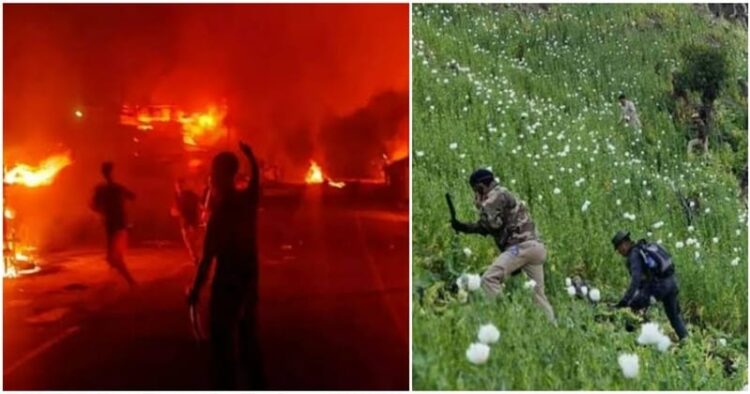New Delhi: There are still many shades of opinion coming in. What really triggered the crisis in Manipur, leading to deaths and displacements. As of now, the most unfortunate thing to happen is the casualty of tribal (Kukis-Nagas) and non-tribal (Meiteis) relationships. This will require time to heal the wound.
Of course, the most easily available reason attributed for the crisis is the High Court’s directives to the N Biren Singh-led Government to include Meitei in the Scheduled Tribe (ST) list. But there could be many other reasons too for the killer communal conflict and violence.
Though late by many years, the central Government will do well to take effective drug control steps and establish institutional mechanisms with countries like Myanmar, Nepal, Bhutan and Bangladesh to counter illicit trafficking. Why raise this issue at this juncture?
Sources quoting reports from various agencies, including from the BJP Government in Imphal, say there has been growing involvement of some armed groups in the poppy business. Hence, the nexus of the drug mafia is not ruled out in an atmosphere wherein there is large-scale starvation for cash.
Demonetisation in 2016, the overall economic crisis and GST in 2017 and the introduction of digital payments by the Modi Government have affected the ‘cash business’ of militant groups across the North East region. Hence, the involvement of some groups in the money-spinning poppy business is certainly a strong possibility.
A few months back, the Manipur Government submitted a report to the centre, and therein it spoke about the need for combining the ‘War on Drugs’ campaign along with the anti-deforestation drive, especially in areas of poppy cultivation.
One source in the know of things told ‘Organiser’ – “What really should raise eyebrows and send warning signals is that the poppy cultivation is on the rise in the North Eastern States as youths are generally getting frustrated and are looking for viable job avenues”.
The Golden Triangle comprising Laos, Thailand and Myanmar is a major corridor of drug production and supply in South East Asia. Moreover, Myanmar is very close to States such as Manipur, Mizoram, Arunachal Pradesh and Nagaland. Myanmar has always maintained an enormous lead over other opium-producing areas.
Sources also say that there has been a sharp increase in drug production in Myanmar since 1990, especially after a sudden spurt of violence, an increase in political unrest and also growing Chinese influence.
True, the helpless, poor villagers in Manipur or other States who have to toil in the poppy fields are more concerned about their meagre wages. Poppy cultivation has increased in a few pockets in Arunachal Pradesh and Mizoram and also in select regions of Manipur, including in Police Station in Kangpokpi, Chandel and Churachandpur districts.
In January this year, Chief Minister N Biren Singh took to Facebook, saying, “Around 15 acres of poppy plantations were destroyed at Lhangsom Village under Saikul police station in Kangpokpi district”.
The Manipur Government also drew a line of caution that the land where poppy was cultivated lost fertility and soon would become unsuitable for other crops and any effort for substituting with alternative crops.
Earlier, only organic farming was practised in the hills. The State Government also took an unusual step and proposed the suspension of National Food Security Act benefits to illegal poppy cultivators.
Hence a lot of developments in Manipur in the last few months could actually be linked to the State Government’s success in crackdown on poppy cultivation and drug business. It goes without saying that by January -February 2023, the State authorities and the Chief Minister himself conducted an aerial survey of poppy cultivation areas.
The State Government also kept the centre and especially Home Minister Amit Shah on loop.
“Some violence and resistance to crackdown on poppy cultivators were expected….But it was smartly linked to tribal-non tribal conflict vis-a-vis ST status,” the source pointed out, adding as many as seven village chiefs of poppy cultivation areas were even arrested and put behind bars.
In December 2022, ‘Outlook’ web magazine carried an article wherein Geetchandra Mangang, Secretary General of Coalition Against Drugs & Alcohol (CADA), a civil society organisation based in Imphal, has been quoted as stating: “The (State) Government is focusing on the supply line of the illegal drugs that are coming from the Golden Triangle. But Manipur is no longer a transit route of illegal drugs; in fact, it is becoming one of the major producers of illegal drugs”.
With the timber business facing a strict ban due to the Supreme Court’s orders since the 1990s and extortion unable to generate the ‘expected resources’ due to general economic crises post-Covid, the insurgent groups are looking for other sources.
At this juncture, thus a message can go easily that further investigations would be required to unearth the truth behind the latest fracas and violence in many parts of Manipur. The State authorities, in coordination with the centre, will have to take other necessary steps as well, and maybe in months to come, take steps in coordination with some neighbouring countries.




















Comments